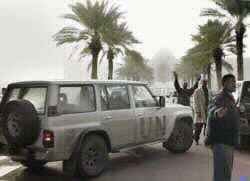U.N. arms inspectors, squeezed between the angry demands of U.S. and Iraqi leaders, were taking a break on Friday as Baghdad drew up a list of weapons programs to meet a Sunday deadline. The arms inspectors were due to carry out their next search operation on Saturday, the day on which Baghdad has said it will hand over to the United Nations a full list of weapons of mass destruction programs.
Under a U.N. Security Council resolution passed last month, Iraq must make that declaration by Sunday.
Washington has demanded more aggressive inspections, insisting that Iraq has maintained chemical, biological and nuclear arms programs since the departure of the last inspectors in late 1998.
"The president of the United States and the secretary of defense would not assert as plainly and bluntly as they have that Iraq has weapons of mass destruction if it was not true, and if they did not have a solid basis for saying it," White House spokesman Ari Fleischer told reporters in Washington on Thursday.
"Iraq has lied before and is lying now about whether they possess weapons of mass destruction," he said.
Baghdad says it has no such weapons programs, and has stated that the list it will hand the United Nations will describe only "dual use technology" that has peaceful as well as military applications.
The inspectors, who have reported cooperation from Iraq during their visits so far to 20 suspect sites, are taking a two-day break on Thursday and Friday for Eid al-Fitr, the Muslim festival marking the end of the holy fasting month of Ramadan.
Washington and Baghdad have used the time to intensify their verbal confrontation, but the list the Iraqis will hand over is crucial to the future of their fraught relationship.
THOUSANDS OF PAGES
One diplomat at the Security Council said the file, expected to be thousands of pages long, would set a baseline for judging violations. "After the declaration has come in, anything that is found shows that (President) Saddam Hussein meant to deceive," he said.
Iraq, for its part, wants the U.N. inspectors to back up its position that it has no weapons of mass destruction.
"Some might claim we didn't give (the inspectors) the proper chance to disprove the American allegations that Iraq produced weapons of mass destruction during the period of the inspectors' absence," Saddam said on Iraqi television on Thursday.
"For that reason we shall provide them with such a chance, after which, if the weaklings remain weak and the cowardly remain cowards, then we shall take the stand that befits our people, principles and mission," he told Iraqi officials.
If Baghdad is found to be in "material breach" of the resolution, it could set the stage for a military attack on Iraq by the United States and its allies in what it has described as a "coalition of the willing."
Defense Secretary Donald Rumsfeld said at the Pentagon on Thursday the Iraqi declaration would go a long way toward determining whether Saddam intended to cooperate.
"They could decide that the game's up and Saddam Hussein and his family could decide to leave the country, which would be a nice outcome," Rumsfeld said.
Or Saddam could decide he "would rather stay in power and reveal all. "And that's a choice he has also."
In the latest indication of U.S. military preparations, Deputy Defense Secretary Paul Wolfowitz went to NATO headquarters in Brussels to propose a support role for the alliance in the event of a war, possibly including providing forces and post-conflict peacekeeping.
After the talks, one diplomat said Wolfowitz had shown "a clear willingness not to rush NATO into things," adding: "The U.S. knows that major partners like France and Germany cannot go further than what was agreed in the United Nations."
U.N. Security Council resolution 1441, the basis of the inspectors' return to Iraq last month, ordered Iraq to disarm fully or face severe consequences.
PHOTO CAPTION
U.N. arms inspectors arrive to search for weapons of mass destruction at an Iraqi Presidential palace in Baghdad, December 3, 2002. (Suhaib Salem/Reuters)
- Author:
& News Agencies - Section:
WORLD HEADLINES


 Home
Home Discover Islam
Discover Islam Quran Recitations
Quran Recitations Lectures
Lectures
 Fatwa
Fatwa Articles
Articles Fiqh
Fiqh E-Books
E-Books Boys & Girls
Boys & Girls  Hajj Rulings
Hajj Rulings Hajj Fatwas
Hajj Fatwas














